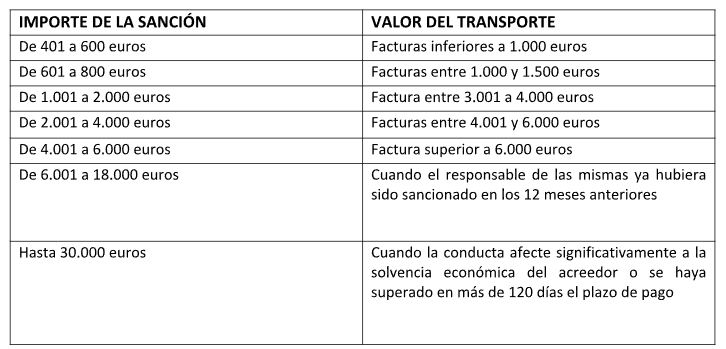Throughout this 2023 a lot of loading companiess have been sanctioned by the General Directorate of Land Transport for exceeding the 60 days deadline for payment of services contracted transport.
This “delinquency” has been a general trend in the healthcare sector. merchandise transports by road in recent years, which presents an average payment higher than the 80 daysand in certain cases exceeds 120 days of delay since the transfer of the corresponding invoice.
It should be noted that these payment deferrals affect the “cash flow” of transport companies whose nature in most cases responds to a SME model and an average number of available vehicles is lower than the 4 trucks.
The transport market follows a model marked by the existence of great number of companiesbut with a very limited loading and negotiation capacity, which is why the consequences of these payment delays irremediably extend to the entire sector, affecting suppliers and rest of associated services.
According to the information provided by the European Comission This situation of late payment generates one in every four insolvency situations of companies with tax headquarters in the EUwhich led to the approval of the Directive 2000/35/EC., Therefore, with the aim of transposing this regulation and incorporating it into the Spanish Regulation, the Ley 3/2004, of December 29, whose article 4 established a general payment term of 30 days natural and a maximum period of 60 days from the provision of the service.
Despite the strictness with which this law established the maximum terms of paypresented an essential defect by not incorporating measures real estate that would discourage late payments and actually penalize companies that paid more than 60 days. For this reason and with the aim of reversing this situation definitively, the Ley 13/2021 “to fight against late payment in the field of road freight transport” that incorporates these delays into the sanctioning regime of the Planning Law of transport and establishes sanctions for companies that exceed the maximum payment limit of 60 days
In order to shed some light on the content of these laws We make a small summary so that it is easy to understand for the reader:
What is the general deadline to pay an invoice? Do carriers have any obligations?
According to the article 4.1 of LAW 2/2004, In the absence of an agreement between the shipper and the carrier, the ordinary period for payment of invoices is 30 days natural from the date of provision of the transportation services, which will be understood as completed once the goods delivered. In the event that the shipper and carrier make an express agreement that establishes a payment term superior in no case may it exceed the 60 days for your satisfaction since the services had been provided under the consideration of “null” or “not set” any agreement that establishes a term greater than this threshold.
Although the same article refers to an express obligation of the carrier to transfer the invoice to the customer before the 15 days natural since the service had been provided, this obligation is independent of the duty to pay on the part of the shipper on whom the obligation to pay the amount of the servicewhich in our opinion is not logical or reasonable.
When does the sanctioning regime provided for in Law 13/2021 operate?
The sanctioning regime operates in the event that the pay of the services is made to the carrier with a period greater than the 60 days since the service was provided.
In general, it is the administration itself that usually requires the company carrier to inform and transfer the documentation of your shipments, detect the situation of late payment and open sanctioning file against the shipper or service contractor; It should be noted that the Ley of the land transportation contract considers the transitory as a shipper with respect to the carrier despite the fact that its intervention is that of intermediary between client and supplier.
It is also convenient to point out that these non-compliances are easily detectable by the administration as soon as the 68% of Payments are made by bank transfer, 27% is carried out through confirming and only 4% is carried out through promissory notes, as well as the 1% through checks.
How much are the penalties?
A gradual sanctions regime is applied depending on the value of the invoice; recidivism in the sanction; and may be aggravated when the conduct significantly affects the economic solvency of the carrier, such as we see below:

Finally, it is worth mentioning that the General Directorate of Land Transport has been applying a reduction of 30% of the amount for those sanctioned who pay the fine in a voluntary period (less than 30 days natural from the moment the agreement to initiate the sanctioning procedure is communicated).
As can be seen in the last Delinquency Observatory prepared by FENADISMER, during the last 6 months These payment terms have been significantly reduced, so it seems that this trend is encouraged by the fear to the sanctions that we have analyzed.
The main problem faced by the application of these new assumptions of the regime sanctionerlies in the fact that a high percentage of shippers is outside the kingdom of Spain, which makes it impossible to apply sanctions on foreign companies and means and comparative grievance regarding local companies.
For its part, the European Comission has already published its proposal for a new European Regulation to combat late payment, which expected to include the reduction of maximum payment terms to 30 days from the issuance of the invoice compared to the current 60 days, which can generate real nightmares to the quantity management departments of companies in Europe.
We will follow very pending the new regulations that are approved next year, since the survival of our modus vivendi It depends on it.

Author: Felipe Serrano Pérez. Fundational partner en International Transport Lawyers
2023-11-08 18:27:39
#paying #transportation #late #expensive #lawyer #answers


